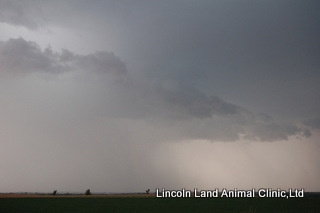 |
It's that time of year again when many dogs become very anxious, excited, or fearful of impending storms, fireworks and noises. How do you know if your pet is affected? A few common symptoms you may see include agitation, panting, pacing, whining, trembling, drooling, hiding, and destruction.
There are many different things we can do to help your dog depending on the severity of the phobia.
|
Most dogs fall into one of three different categories:
Mild
If your dog can be distracted by food, treats, favorite toys, and/or play time, that is great! It is time to start with behavioral modification so that your dog does not progress to the next stages, but instead has the coping skills necessary to handle the storm.
Moderate
If your dog cannot be distracted by food, treats, favorite toys and/or playtime they may need short term drug therapy in addition to behavior modification.**
Severe
If your dog is panicking, uncontrollable, and may cause injury to himself or others then he needs help immediately. These dogs need drug therapy** in addition to behavior modification protocols.
It is very scary for your dog to be in a situation such as this where they have no control. It is our goal to help you help your dog learn what to do. First and foremost we need to decrease their anxiety so that they are in the correct state of mind to learn. Please note that behavior modication is indicated in every category. Just giving your dog medication only decreases their anxiety. It doesn't teach them what they need to do to help themselves be more calm.
Strategies to Implement Immediately:
Safe place
Provide a safe and secure place such as a crate, a closet, or the bathroom or basement. Internal locations with the shades drawn, or no windows at all seem to provide most pets with the most comfort. If the pet is already hiding, do not attempt to move them. You might use this hiding place as their safe place. Please keep in mind fearful pets are more likely to bite.
Distraction
Have your pet play with a distracting toy or initiate a trick and treat session so they can focus on something besides the noise/storm.
White noise
This helps to replace the anxiety-inducing sounds with something more comforting such as a fan, television, or music your pet enjoys. "Through a Dog's Ear" has a selection of songs that calms many dogs. Try video taping your pet's reaction to certain sounds to make sure the music is actually decreasing the symptoms.
Products
Thundershirts, calming caps, and Adaptil collars may help reduce stress. The thundershirts and calming caps are snug and produce an effect similar to swaddling an infant. Adaptil is Dog Appeasing Pheromone it the pheromone that the dog's mom released when she was nursing the puppies, it helps to calm them.
Punishment
It is important to cease punishment. When animals are fearful, punishment of any type makes them more fearful and tends to erode the relationship between owners and pets.
Videotaping your pet's reaction after using different techniques helps to identify those strategies that were more or less helpful in decreasing the symptoms. This is important so that different strategies can be combined to find the best combination for your pet.
Strategies to Implement for Long-term Success:
Desensitization, counter-conditioning, behavior modification, and/or medications should be used to help teach your dog coping skills for long term success. A veterinarian can evaluate your pet's severity and formulate a specific plan for desensitization, counter-conditioning and behavior modification. The doctor may also prescribe anxiolytic drugs. Some dogs need to be on medication for the entire season, while other dogs might only need treatment only during storms or noisy events such as fireworks during holidays. Many long term medications need to be started prior to the thunderstorm season and then your dog may be weaned off the medication at the end of the season. **
It is important to help your dog at the early onset of phobia. Just like people, phobias do not tend to go away, and tend to get worse, if left untreated. It is important to continually try to modify the behavior instead of just medicating. Please contact us to set up a behavior modification program for your pet.
Thunderstorm and noise phobias are difficult to assess in a laboratory setting. It is important that you give us feedback on what has helped your pet the most.
If you feel your pet may have a thunderstorm or noise phobia, please contact our office with any questions.
An ounce of prevention is most definitely worth a pound of cure when it comes to noise sensitivity and phobia. Visit our Preventing noise phobia page if you have a new puppy or a dog with mild noise sensitivity for easy suggestions on how to help your pup or new dog.
** It is necessary to monitor dogs on any kind of medication with regular bloodwork.
|